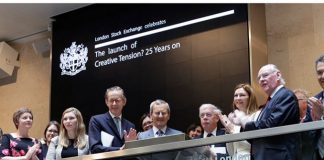Tag: Markets
Reflection on the Kay Review and corporate governance
John explains the one thing he'd do if he could now revise the Kay Review of UK Equity Markets and Long-term Decision Making and identifies ways to improve corporate governance.
Modern business, modern markets
Our markets need to adapt to the changed nature of 21st century business if they are to remain relevant in a world in which capitalism has little need of capital.
No savings glut, investment opportunities abound
The belief that the zero lower bound to interest rates is a significant obstacle to stimulating demand supposes that there is a host of projects that promises a prospective return less than zero but more than, say, minus one half per cent. This completely misunderstands the nature of the barriers to long-term productive investment. We need less financial ingenuity and more common sense.
Balance sheets understate the scale of complexity in the financial system
JPMorgan and Deutsche Bank account for about 20 per cent of total global derivatives exposure. The risks associated with these exposures are largely netted out. But how well? Your guess is as good as mine, and probably not much worse than those in charge of these institutions.
HBOS report yields three important lessons for all businesses
British regulators have finally published their report into HBOS, the bank formed from the merger of Halifax with Bank of Scotland, more than seven years after its collapse. The 600-odd pages contain much detail on events and personalities. But there are general lessons for all businesses. Avoid the diversifier’s fallacy. Beware the winner’s curse. Fear adverse selection.
Lower business rates would benefit property owners not retailers
Retailers have recently complained about the level of business rates. However, were this property tax is reduced their joy will be short lived. Business rates are both a tax on land and a tax on structures, and in the longer term all we would see is higher property values and rents, especially in prime locations.
We were better served by old-fashioned relationship-focused bank managers
The bank manager used to be a community figure who would base his (they were all men) lending decisions as much on his local knowledge and the character of the borrower as on figures. He did rather better than his modern-day, intellectually-superior equivalent.
Must we endure excessive drug prices to encourage pharmaceutical R&D?
A mechanism of funding pharmaceutical research which leads to drug prices far in excess of marginal cost is bound to lead to anguish and injustice. But is there a better idea?
The best strategy is to be good at whatever it is...
Michael Porter warned on the danger of being “stuck in the middle”. Companies, he said, must either gain a cost advantage or emphasise product differentiation. But what really matters is enjoying a competitive advantage in the market position you choose.
To assess value it’s wise to escape the market crowd
The belief that an aggregate of casual opinions provides a better process of value discovery than a flow of informed judgment through close engagement by investors, is an article of faith rather than a matter of empirical evidence.








